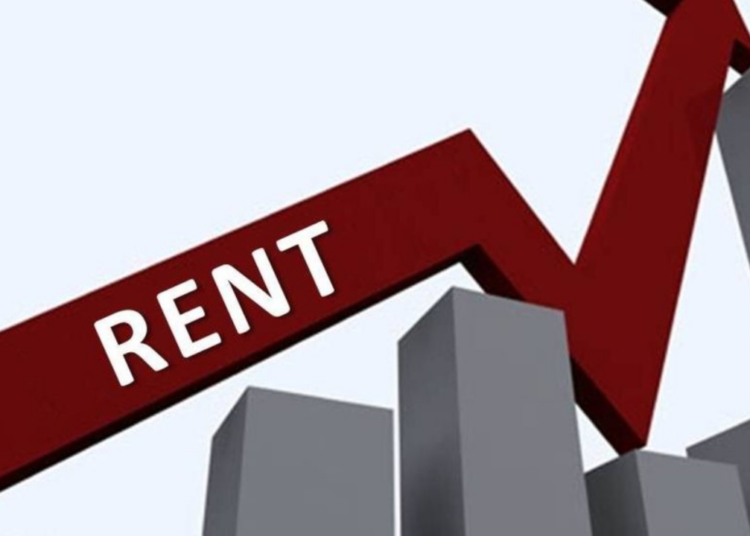The hike in rental value is putting enormous pressures on higher mortgages rates, housing insurance plan, increase in rental rate, devaluation of long-term debt, as well as increase in the cost of construction and distortion in the economy, LEADERSHIP learnt.
The precarious state of rental surge is distorting housing market and affordability to rent decent homes as stakeholders in the real estate sector have expressed the need for the government to synergize with the private sector and sundry players in the industry to stem the tide of the housing crisis in the country.
The real estate rental segment is grappling with gallop and rent inflation, such that the precarious state of the property market sector is rising in astronomical proportions.
Sundry players in the property market sector believe that the recent surge in rental value is triggered by forces of supply side inflation, volatility of the forex market, economic disruptions, fiscal economic policy, debt burdens, high inflationary environment amongst other macroeconomic shocks leading to price inflation.
Obviously, the housing sector is gripped with high cost of building reinforcements, hyperinflation and cost of importation such that rental cost of urban housing areas has reached crisis levels, thereby forcing many young and promising Nigerians to live in rural parts.
Similarly, rents have increased by about 75 per cent in densely populated cities like Lagos, Abuja, and Port Harcourt, where the hike has risen to about 50 per cent in certain locations in the last three years. For example, a duplex of four-bedrooms that was let out for N4 million to 4.5 million is now going for between N6m and 7m yearly.
Other locations, especially, the high-density residential segments within the hinterlands in Lagos, have also witnessed almost double in the last three years.
For example, in Lagos, a three-bedroom apartment in Yaba with great demand has seen rental growth as high as 60 per cent within the last two years. High-end neighbourhoods have enjoyed similar rental growths, but over a longer period.
For example, in Lagos, a three-bedroom apartment in Ogba with great demand has seen rental growth as high as 60 per cent within the last two years. High-end neighbourhoods have enjoyed similar rental growths, but over a longer period.
Rental prices in Yaba, Surulere, Oyingbo,: Three-bedroom (N2.1 million); four-bedroom (N3.4 million); Surulere: three-bedroom (N2.2 million); four-Bedroom (N3.5 million); Gbagada: three-bedroom (N2.5 million) and four-bedroom (N3.2 million); Ikeja GRA: three-bedroom (N5.8 million) and four-bedroom (N8.9 million).
In Magodo GRA: three-bedroom (N2.6 million) and four-bedroom (N4.5 million; Festac: three-bedroom (N2.3 million) and four-bedroom (N3.3 million); Apapa: three-bedroom (N2 million) and four-bedroom (N4m); Lekki Phase 1: three-bedroom (N4.6m) and four-bedroom (N5.5 million).
Similarly, in Ikoyi: three-bedroom (N13 million) and four-bedroom (N15 million); Banana Island: three-bedroom (N15 million) and four-bedroom (N19.5m); Victoria Island: three-bedroom (N6 million) and four-bedroom (N8.5 million).
Estate surveyors and valuers, including property developers, who confirmed the development, traced the situation to market forces of demand and supply, as well as decline in vacancy rate.
One of the commentators who spoke on the condition of anonymity said it is the responsibility of governments to provide housing for the poor and vulnerable people who have special needs.
A past president, International Real Estate Federation, (FIABCI) Nigeria, Chief Kola Akomolede, who agreed that rents have increased across board in the major cities, particularly, in Lagos, said it was owing to inflation derived from devaluation of the Naira.
“Supply has also been reduced as a result of the high cost of construction of new houses. Vacancies have reduced because of the reduction in supply and not many are changing houses due to higher costs,” he said.
According to Akomolede, property developers are still building houses but the quantity has reduced drastically due to high costs of land, building materials and finance.
A past chairman, Faculty of Estate Agency and Marketing, Nigerian Institution of Estate Surveyors and Valuers (NIESV), Mr. Sam Eboigbe, said since the global economic meltdown imparted prices of goods and services, the property market will not enjoy immunity from the effects.
However, he said rent hike is not applicable to the whole gamut of residential properties, “we have, nevertheless, in some instances witnessed stability and reduction in the price adjustment in low-density housing types.
“Conversely, the medium and high density housing segment located within the hinterlands have witnessed extremely upward adjustments in the rental levels in the post-COVID-19.
“Requests for residential property listings post COVID have remained on steady increase, while demand for the retail side has been experiencing decline.”
Eboigbe blamed it on the interest rate that has been all-time high, which has a cumulative effect on hampering access to credit, adding that most finished products in the marketplace have ongoing mortgage repayments.
The effect of exchange rate is that transactions can be frustrated due to the effect of unstable naira. The rising interest rate has not also encouraged stakeholders in this sector.
For him, projects initiated by developers are still ongoing, but the numbers have significantly reduced, while some have been completed and fully sold out in some cities.
“In Lagos, for instance, Lekki, Ikoyi and Victoria Island locations have ongoing projects ranging from high-quality finished and well-serviced luxury residential blocks of one, two, three and four-bedroom apartments,” he said.
Chairman, Real Estate Developers Association of Nigeria (REDAN), South West, Debo Adejana, said all the rents were reviewed last year in city centres, as rent cannot be separated from the economy.
“What we’re experiencing is a reaction to inflation in the system. Every property given out for rent is largely an investment property for the owner and returns are expected. As prices of goods continue to jump, landlords would demand higher rent.”
He said fewer properties were completed in the past three years, which indicates that property stock fell within the period, as production has not caught up with demand due to increased population.
Adejana pointed out some tenants have also moved out of city centres to the outskirts or fringes owing to rent increases.
Property watchers have, however, advised the government to take actions to ensure affordability.
Okosun, in fact, called for public-private partnership, making mortgages more accessible and affordable, and for longer terms.
He also urged the authorities to make land more affordable, increase density, encourage vertical housing and amend the Land Use Act.
Akomolede said in a situation where the government does not control the supply or demand for housing, there is little it can do to influence the price or rent.
He called on the government to reduce the cost of acquisition of land, cost of obtaining Certificate of Occupancy, governor’s consent, ratification and planning approval.
He also suggested reduction in Customs and Excise duties on building materials as a means of bringing down the prices. “Government should pay more attention to housing and give it the same priority as health, education and roads. For now, housing is not on the priority list of all the governments, federal, state or local government,” Akomolede added.
Eboigbe called on the government to declare an emergency in the housing sector. “Some provisions of the land use decree should be refined. Where the administration of land is vested in the governors is actually making it cumbersome to resolve lingering issues.
“Acquiring governors’ consent and land titles are issues hindering housing delivery. The cost of building materials, exchange rate and interest rates are all hindering successful delivery of housing,” he said.
Addressing Housing concerns, minister for housing and urban development, Ahmed Dangiwa, said recently that the prices were beyond the reach of the target market – low to medium-income earners, and the locations were inaccessible.
He added that the situation has tied up significant government funds, and without swift action, these houses could begin to deteriorate. One assurance I can provide is that, under my leadership, I will prioritise affordability in house design and delivery.
In the case of this specific project, we will carefully study and review the factors that led to the current pricing and determine the best approach to make these houses accessible to Nigerians.
The goal is to promote affordability, attract potential buyers, and ultimately ensure that these housing units benefit Nigerians,” Dangiwa said.
Speaking in a Media chat, Real estate consultant, Arch Wale Babatunde, said social housing is literally non-existent in Nigeria at the moment as governments at both federal and state levels have faltered on schemes planned to deliver such houses while private investors remain indifferent to developing for people who need such houses.
Also speaking, former REDAN Auditor, Southwest and managing director of Rocccio Carillo property Investment, Emmanuel Oyelowo, noted that, since Shagari and Jakande, whatever any government has said or done as social housing or low-cost housing has ended up as mere paperwork or political statements aimed to achieve selfish interests.
According to him, while private developers say they don’t want to build social housing because they spend a lot of money to acquire land and the cost of building materials is high, the governments who seem to be competing with the private sector say they also buy materials from the same market.
This is as the chief executive officer (CEO), JJ&J Property Management Consultant, Ezekiel Oke said the looming surge in interest rates is expected to drive a substantial 5.5 percent growth in property prices nationwide.
He lamented that the surge in interest rates will exert greater pressure on rental prices than on house prices.
Ezekiel Oke revealed that apart from incentives such as tax holidays for young thriving businesses, we also urge the government to deal with issues such as urban and rural roads, high interest rates, high cost of building materials; Land Use Act, and high poverty levels in the country.
He espoused that all of these are obstacles to home-ownership adding that if the government is able to neutralise these obstacles, the goal of social housing would be achieved.
We’ve got the edge. Get real-time reports, breaking scoops, and exclusive angles delivered straight to your phone. Don’t settle for stale news. Join LEADERSHIP NEWS on WhatsApp for 24/7 updates →
Join Our WhatsApp Channel










